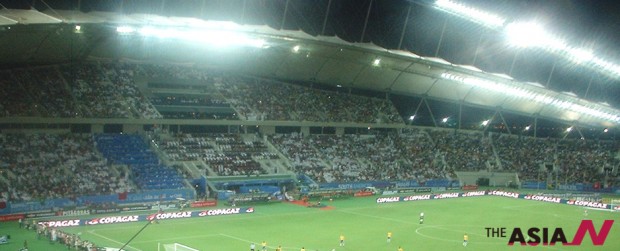2022카타르월드컵 건설현장서 1천2백명 사망···걸프국서 외국인노동자 처우 갈수록 ‘악화’

* ‘아시아엔’ 해외필진 기고문의 한글요약본과 원문을 함께 게재합니다.
[아시아엔=아시라프 달리 아시아엔 중동지부장·번역 김아람 기자]?최근 걸프지역 국가들이 외국인 노동자를 포함한 체류 외국인들에 대한 규제를 강화해나가고 있다.
국제유가 하락세에 큰 타격을 입은 쿠웨이트가 그 중 하나로, 체류?외국인들에 제공하던 공공 의료서비스 중단을 고려하고 있다.
카타르의 경우는 더 심각하다. 영국 <BBC>에 따르면 오는 2022 카타르 월드컵 경기장 건설에 동원된 외국인 노동자 1천2백명이 사망했다. 근무환경이 열악한 탓이다. 긴 시간을 땡볕에서 견디며 일하는 이들은 시설도 제대로 갖춰지지 않은 지저분한 숙소에서 생활한다. 그에 비해 돌아오는 보상은 터무니없이 적다.
지난 5월 카타르 정부는 월드컵경기장 공사현장을 취재하던 <BBC> 기자를 사유지 무단침입죄로 체포하기도 했다. 당시 카타르 정부는 오히려 “BBC 기자가 카타르의 외국인 노동자 근로 및 생활여건 개선을 위한 노력과 진전을 제대로 보도하지 못한 데 심히 유감”이라고 전했다.
사우디 아라비아는 체류 외국인의 인권을 탄압하고 있다. 20일 외신 보도에 따르면 사우디 법원은 팔레스타인 시인 출신 아시라프 파야드에 이슬람을 모욕했다는 이유로 사형선고를 내렸다. 수니파 이슬람 국가인 사우디아라비아의 사법 체계는 이슬람 율법인 샤리아에 기초한다. 이에 성직자들로 구성된 현지 재판부는 신성모독과 배교를 사형에 처해야 할 범죄로 보고 있다.
이렇듯 걸프 지역의 외국인 노동자 및 체류 외국인들에 대한 인권 유린, 저임금 등 사회적 차별의 정도가 심각해지고 있다. 물론 국가마다 그 정도에 차이가 있기는 하다. 그나마 아랍에미리트(UAE)가 사정이 낫다고는 하나, 물가가 비싼 탓에 외국인 노동자들이 쉽사리 선택하기 쉽지 않다. 출입국 심사 때부터 시작되는 차별은 그저 시작에 불과하다.
The War against Expats in the Arab Gulf States
It needs you a few minutes to search the headlines to realize the active war of the Arab Gulf States authorities against expatriates who live and work there, as many procedures have been taken into effect regarding the current and future expats.
Kuwait is considering to stop all access to public health services for expatriates, though they pay KD 50 ($165) per year for every individual health insurance. The idea is to reduce stress on the government budget, weakened by lower oil prices in the international market.
Suggestions in this regard include doing away with ‘harmful subsidies’ which include healthcare for expats in public medical facilities, according to a report by the Supreme Council for Planning and Development. According to the daily newspaper Kuwait Times, there is an official call for imitating an example followed in the 1990s when the Kuwaiti government scrapped free education for expatriates in Kuwait, thus banning foreigners from studying at public and forcing them to enroll in private schools. The action led to a boom in the private sector, and skyrocketing of private school tuition fees in the country that has almost 3 million expatriates.
All news regarding expatriates are negative. Recently a high rank officer in the Ministry of Interior was interviewed on TV, who said that visiting family visas are too easy, as the coming people are enjoying free dinner meals every day by visiting the wedding parties!
Now, there is a growing fear of deporting anyone who might act against the law. Lately, the Kuwaiti authorities deported without trial 17 Egyptians and six Syrians after they were involved in a mass brawl over a commercial dispute. It is not only the official authority that acts against expats, as Kuwaiti citizens with racist intentions are worse. Recently a young Egyptian expat, named Ahmed Atef, was killed as a fight broke out between a group of Kuwaitis and Egyptian expat worker Mohamed Amin when they allegedly differed over a set price of a PlayStation game console. The two Kuwaitis wanted to buy the console at half its price, and later one of them drove his car over the victim. The Egyptian Embassy in Kuwait released a statement, announcing its condolences to the victim’s family. Egyptian diplomats are in contact with Kuwaiti officials to follow up on the investigations, and the Egyptian consulate assisted Atef’s family in Kuwait to receive his death certificate and sent his body to Egypt. An official from the Egyptian consulate went to Hawally prison in Kuwait to follow up on those who were arrested.
The scene gets worse in Qatar. According to BBC, the scandal surrounding corruption within world football’s governing body, FIFA, has focused fresh attention on the workers who have died building stadiums in Qatar for the 2022 World Cup. The figure of 1,200 deaths is often cited. Living and working conditions for migrants in Qatar?are appalling. Long hours in the blazing heat, low pay and squalid dormitories are a daily ordeal for thousands; they cannot even leave without an exit visa. Qatar is clearly worried about stories getting out about the workers’ suffering. The Qatar authorities arrested a BBC team in Doha investigating the real story.
In Saudi Arabia, the news about the shameful and harmful actions of the Kingdom’s authorities against Arab citizens who live and work there, has become regular. Recently, a Saudi Arabian court sentenced the Palestinian poet Ashraf Fayadh to death for apostasy (abandoning his Muslim faith).
As published by Reuters, Mr. Fayadh was detained by the country’s religious police in 2013 in Abha, in southwest Saudi Arabia, and then rearrested and tried in early 2014. The verdict of that court sentenced him to four years in prison and 800 lashes, but after appeal, another judge passed a death sentence on the Arab citizen. Such judgments are common for many reasons, such as insulting the King, and that has forced many other Arab expats living in the KSA to flee.
Work agreements with violated human rights, low wages, social abuse and other types of harassment are among the rising problems facing the expatriates living in the Arab Gulf States, with different degrees from a country to another. While UAE is considered the best, it is also the most expensive one for average workers. In all Arab Gulf States, differentiation starts at the passport check point, but it does not end there.





